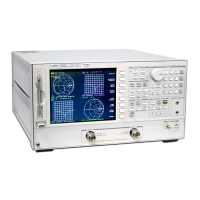7- 19
Operating Concepts
Sweep Types
• center/span/number of points/power/IFBW
• center/span/step/power/IFBW
See “Setting Segment Power” and “Setting Segment IF Bandwidth” on page 7-19 for information on how
to set the segment power and IF bandwidth.
The subsweeps may be entered in any particular order but they cannot overlap. The analyzer sorts the
segments automatically and lists them on the display in order of increasing start frequency, even if they are
entered in center/span format. The data is shown on the display as a single trace that is a composite of all
data taken. The trace may appear uneven because of the distribution of the data points, but the frequency
scale is linear across the total range.
Once the list frequencies have been defined or modified, the list frequency sweep mode can be selected
with the
softkey in the sweep type menu. The frequency list parameters can
also be saved with an instrument state.
Setting Segment Power
To enable the function, you must first select in the edit
subsweep menu. List power is off by default and the asterisks that appear in the "power" column of the list
table indicate that power for the sweep is being set by the normal analyzer power controls.
The power settings for all segments are restricted to a single power range. This prevents the attenuator
from switching to different settings mid-sweep. Select the power range and then edit the list table to specify
the segment powers. If the power range is selected after the list has been defined, the list settings may be
affected.
When analyzer port power is uncoupled, the segment power level can be set independently for each port. To
do this, you must first select a measurement parameter to activate the port whose power you want to set.
For example, select S11 to set port 1 power, or S22 to set port 2 power. (Notice that the list mode table will
only display the currently selected port in the table. This is due to restricted display space.)
When analyzer port power is uncoupled, the softkey can also be set
independently for each port. For example, you may choose to set for forward
measurements and for reverse measurements. In this case, the power would be
set according to values in the list when measuring the forward parameters. When measuring the reverse
parameters, the power would be set according to the normal analyzer power controls.
Setting Segment IF Bandwidth
To enable the function, you must first select in the edit
subsweep menu. List IF bandwidth is off by default and the asterisks that appear in the "IFBW" column of
the list table indicate that the IF bandwidth for the sweep is being set by the normal analyzer controls.
Narrow IF bandwidths require more data samples per point and thus slow down the measurement time.
Selectable IF bandwidths can increase the throughput of the measurement by allowing you to specify
narrow bandwidths only where needed.
Power Sweep (dBm)
The softkey turns on a power sweep mode that is used to characterize
power-sensitive circuits. In this mode, power is swept at a single frequency, from a start power value to a

